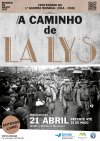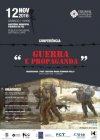«Prisioners of War in the Twentieth Century - Actors, Concepts, and Changes», ciclo de conferencias organizado por Ana Paula Pires, Jakob Zollmann, Maria Fernanda Rollo e Martim Arinto, terá lugar na Faculdade de Ciências Sociais e Humanas em 24 e 25 de Novembro de 2014. A organização apela, através de Call for Papers, à participação de todos os interessados na temática, que tenham trabalhos não publicados e inovadores, e que desejem partilhar os resultados das suas investigações durante estes dois dias.
As normas de apresentação, assim como os objectivos do encontro, são os seguintes:
«“Prisoner of War” is first of all a term in international law, and more specifically the laws of war. The term defines a status which comprehends a number of rights or entitlements and duties for those enemy combatants captured during a war. The twentieth century saw a marked change in these legal provisions; and at the same time the number of individuals reduced to captivity in the hands of the ‘enemy’ surpassed all previous experience. Millions of men and women were detained – some for several years – and, irrespective of any legal entitlements, millions died as Prisoners of War. Without their involvement in the industrial and agricultural sector of the belligerent nations, war production may have come to a standstill in several conflicts.
With the objective of introducing new research and perspectives on the history of Prisoners of War, this conference aims at bringing together researchers of a variety of academic disciplines. There is no particular geographical focus and we hope to include interdisciplinary analyses from all continents in our conference.
The suggested range of topics includes (but is not limited to the following):
• Concepts of “Prisoners of War” (This section may analyze the history and development of different legal terminologies of POW and/or provisions regarding POW; [debates about] national and international standards of treatment; …
• Organization and administration of Prisoners of War (Political, military, and economic aims of ‘handling’ POWs; action and reaction of POWs and their guards; everyday life of POWs; …)
• Violence against/of Prisoners of War (Different forms of treatment of POWs; hierarchies within POW-camps, notions and acts of revenge; hunger and/or neglect as a weapon; …)
• Places of/for Prisoners of War (Introduction of the camp system; transport of POWs into the nation’s ‘heartland’; relations with neighbors; different workplaces; …)
• Time and Memory (Duration of captivity; forms of remembering home; families remembering their sons/brothers/etc. in captivity; keeping alive one’s own memory of having been a POW …)
• Literature/Art (POWs as objects of literature; [former] POW writing about his/her captivity; producing art as POWs; …)
• Economy of POWs (Relevance of POW-labor for war efforts/national income; economic situation of POWs; shadow-economies of POW-camps; post-war negotiations; forced labor; …)
To apply please send proposals in English, Portuguese, or French (word format) with an abstract (2 000 characters and title), with surname, first name, post and institutional affiliation, email) and a short biography (500 characters) by April 30th 2014 to the organizers at Este endereço de email está protegido contra piratas. Necessita ativar o JavaScript para o visualizar.
Papers should be previously unpublished and contain original research. Organizers intend to publish a selection of papers from the conference in a book volume.
The presentation and paper should be in English, Portuguese or French.»
Desejamos a todos os candidatos boa sorte nas suas apresentações e aos organizadores que o evento seja profícuo em novidades e fomentador de um produtivo debate.









Comentários